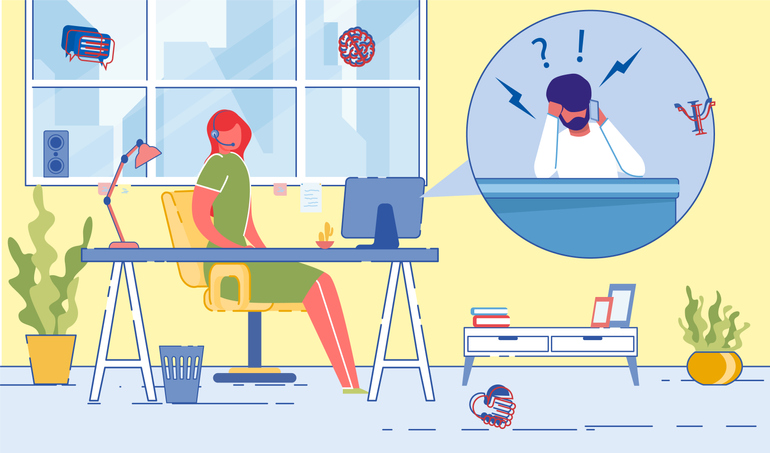
Fears about a loved one getting sick. Worries about finances.The stress of being stuck inside. As the Covid-19 pandemic rages on outside, more people are experiencing these emotions, and it’s taking its own toll on their health.
The Disaster Distress Helpline, a federal crisis hotline operated by the Substance Abuse and Mental Health Services Administration, has seen a spike in calls of more than 300% since February. Compared to March of last year, the hotline has seen 891% more calls, according to CNN.
Companies, seeing the toll on their employees, have also been looking for ways to boost their mental health benefits. Most private insurers have expanded their telehealth coverage, allowing members to access virtual visits with a therapist — sometimes with no co-pay. Other companies have turned to digital health services to help fill in the gaps.
After an internal survey showed 36% of its employees were reporting mental health concerns during this time, Salesforce began offering its employees virtual workouts and meditations, and announced it wouldn’t cut any staff for the next three months.
Starting in April, Starbucks began offering 20 free therapy sessions each year for its employees and their families, through a partnership with mental health startup Lyra Health.
Another mental health platform, Supportiv, said it had seen increased interest from employers. The company, which connects users to moderated peer support groups, recently brought on Walmart as a client and is working with other Fortune 50 companies.
“We’ve had no lack of interest among health plans,” Co-founder and CEO Helena Plater-Zyberk said in a phone interview. “In the past year that interest has intensified and urgency has intensified. We’re getting a lot of inquiries on how fast we can mobilize to serve new populations.”
The program isn’t therapy, but is instead modeled after peer support groups. Because it sounds less clinical — it doesn’t specifically ask users about a diagnosed mental health condition — the platform has been able to bring in users that have never gone to therapy. 58% of its users are male, Plater-Zyberk said.
Supportiv’s users are sorted into groups focused on a common topic, such as loneliness or relationships. Since the beginning of March, the platform has seen a spike in topics related to Covid-19, including concerns about chronic conditions, caregiving, job security and being separated from their families and friends.
“Hopelessness and helplessness are two words that keep coming up,” Plater-Zyberk said. “I see a lot of concerns about existing health conditions. People who have chronic conditions are extremely worried that their care will be curtailed. That’s causing an extreme amount of stress.”
Some of these issues, such as health or caregiving concerns, might not be topics that people associate with therapy. Dr. Doreen Marshall, vice president of programs for the American Foundation for Suicide Prevention, said people might seek help just in handling disruption to their everyday lives. For example, trying to balance work while having kids home from school.
“Reaching out for those reasons right now is vitally important,” she said. “I don’t think someone has to have a mental health concern to reach out right now. Even if it’s just, ‘I’m having a hard time navigating day-to-day life right now.’ We don’t want folks to sit back and say, ‘I’m not struggling enough.’”
Other digital health tools that are focused on helping patients with chronic conditions have built out their mental health resources after getting feedback from clients. AbleTo, which offers eight-week virtual therapy programs for patients with heart failure and other health conditions, has seen a 25% uptick in the number of people using its services.
“The folks we interact with are the ones who have been told they are at higher risk if they have the coronavirus,” said Dr. Reena Pande, a trained cardiologist and AbleTo’s CMO. “It’s a group that is particularly anxious and fearful given the situation.”
AbleTo currently works with nine different insurers, including Medicare and Medicaid, accounting for more than 20 million covered lives. Pande said her company had seen a number of incoming requests from clients and partners to find ways to expand the scope of their mental health services.
“We’re broadening the hours of our existing therapists and recruiting new providers,” Pande said. “We’re thinking of all the ways we can make sure we’re shoring up our capabilities.”
Omada Health, which primarily serves patients with type 2 diabetes, prediabetes and hypertension, retooled its behavioral health programs after receiving requests from employers. CEO Sean Duffy said the company saw a tenfold increase in requests for mental health support from the company’s participant base.
“The moment Covid started to really capture popular attention in the U.S., we had an immediate influx of asks from our participants for support in mental health,” Duffy said in a phone interview. “Employers and health plans really need depression and anxiety solutions right now. We’re making sure we’re appropriately adapting with the changing times.”
Omada’s services allow users to message a health coach. The company began offering its mental health program to employers for free. So far, it has been well received, with more than 50 companies making inquiries in the last day.
Duffy said the company is planning out future iterations. For example, what support will employees need later in the year, as pockets of the country start to reopen?
“It’s not going to be the same,” he said. “The way we reemerge into the physical world is going to be different.”
The national crisis line can be reached at 800-273-TALK (8255).
Photo credit: Microne, Getty Images










